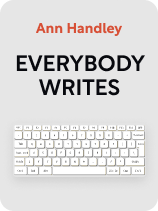

This article is an excerpt from the Shortform book guide to "Everybody Writes" by Ann Handley. Shortform has the world's best summaries and analyses of books you should be reading.
Like this article? Sign up for a free trial here.
How is writing for video different from other writing formats? Does grammar matter? How should you punctuate the text?
In Everybody Writes, bestselling author, speaker, and digital marketer Ann Handley offers a comprehensive guide to writing everything you need to write in today’s business world. The book’s main focus is on writing for marketing purposes, and she discusses how to write for video.
Continue reading to learn these practical tips that are useful regardless of the type of video you’re writing for.
Writing for Video
Handley emphasizes that the content you create will vary depending on the format and your intention as a writer. The writing you’ll use in emails to bosses and colleagues will have different rules than writing an email to your customers, writing for social media, or writing for video. In all of these types of writing, Handley recommends keeping your brand voice consistent. However, your tone may need to shift to match what you’re writing.
Like social media, video is a relatively new medium whose writing guidelines differ significantly from most other writing formats. Rules of grammar are far less important, Handley says, as your customers won’t be reading your writing but hearing it out loud. In writing a script for a video, story becomes even more important and useful, and you should rely heavily on visuals to communicate that story. Also write your script as it’s going to be read—with commas and ellipses to indicate pauses or trailing off, for instance—so that it doesn’t sound like the subject is reading straight from a script.
(Shortform note: Video tends to be the best-performing online content and appeals strongly to younger audiences. In fact, research shows that much of Gen Z uses the video-only platform Tik Tok as their primary search engine, giving brands a unique opportunity to reach that younger demographic through video content. If your target audience is people under 30, video may be your best tool for reaching them.)
Handley suggests that your format will determine your content, but be aware, too, that your content will determine your format. Much of business writing falls into four categories, each with a different purpose: informational writing designed solely to convey information, instructional writing designed to teach the reader how to complete a task, persuasive writing designed to sway your reader’s opinions or beliefs, and transactional writing designed to elicit a response or interaction from your reader. Each of these purposes has its own distinctive goals and audiences, which will determine which format is right to deliver that particular message.
(Shortform note: The tone you adopt can have a significant impact on your brand’s connection with your audience, particularly on how much trust they have in your brand. Research shows that using an inappropriate tone of voice—for example, writing too informally or humorously about mundane or serious topics—reduces customers’ trust in a brand, which makes your brand less desirable to them.)

———End of Preview———
Like what you just read? Read the rest of the world's best book summary and analysis of Ann Handley's "Everybody Writes" at Shortform.
Here's what you'll find in our full Everybody Writes summary:
- Why there is no such thing as a bad writer
- A guide to improving your writing and reaching your audience
- How to adapt your writing to different formats while maintaining your voice






